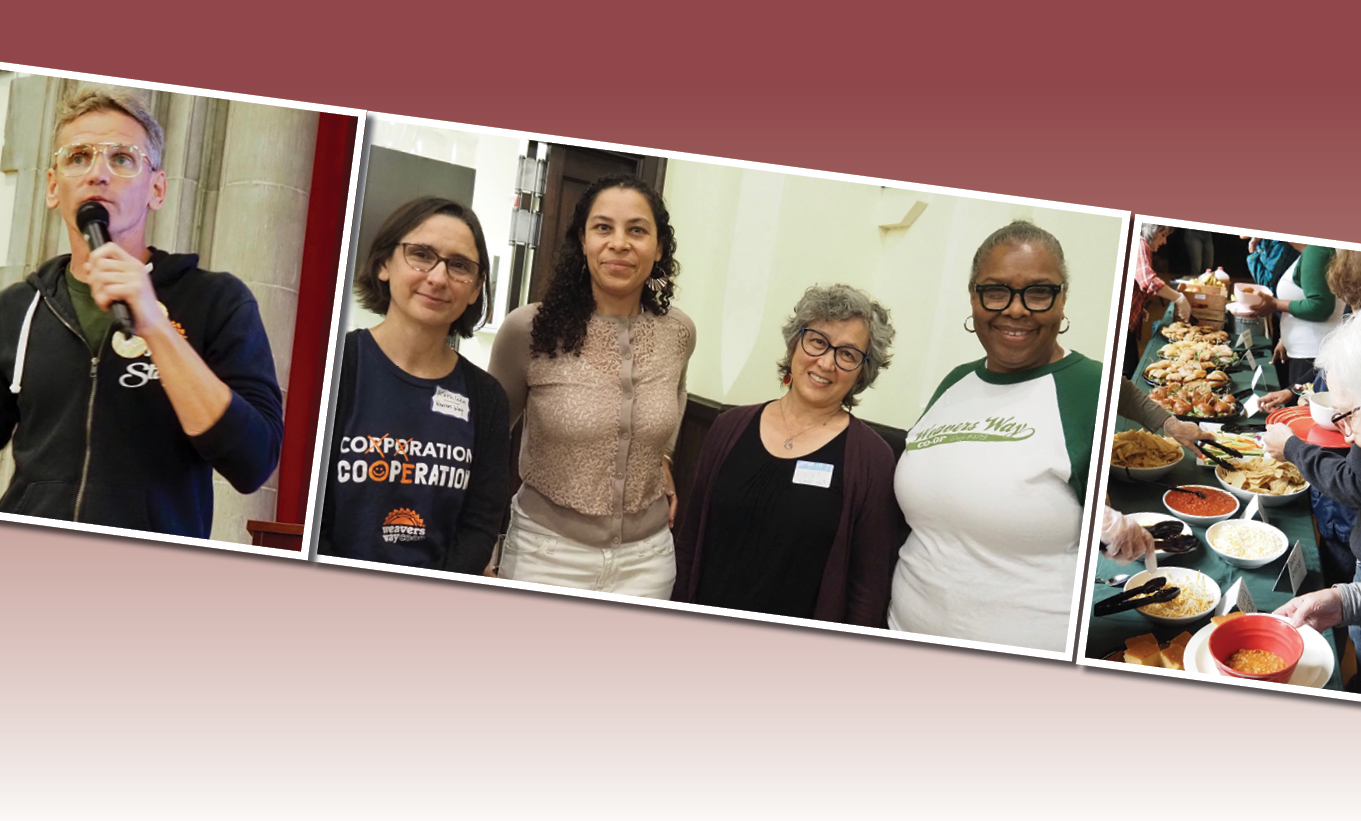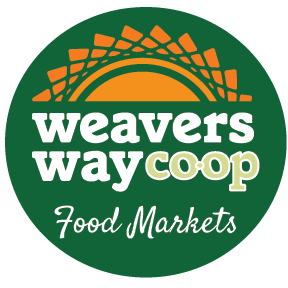Home

Fall GMM Features Discussion on Store Mural
Weavers Way members who attended the Fall General Membership Meeting on Oct. 11 at the Waldorf School of Philadelphia experienced the usual aspects of the twice-a-year gathering: a meal prepared by Weavers Way Kitchens and a rundown of the Co-op’s current financial picture from General Manager Jon Roesser. But they also got a bonus: A peek at the proposed design of the mural for the Germantown store from Mural Arts of Philadelphia artist Eurhi Jones, along with the opportunity to offer their input.
The business part of the meeting was introduced by Weavers Way Board President Cheryl Croxton, who started off by thanking those who attended the Mid-Atlantic Food Cooperative Association conference, which took place at the school earlier in the day. She also gave a shoutout to new Board members Ariel Baumet, Melissa Easy and Cedric Hardy, and mentioned that last month, General Manager Jon Roesser celebrated 10 years in his current position.
Roesser began his presentation by guiding the audience through a graphic that broke down what the Co-op does with every dollar that comes into the stores. The largest amount — 66 cents — goes to vendors and reflects the cost of goods that are sold. Twenty-four cents goes to labor costs, including wages and employee benefits. Four cents of it goes toward discounts, while three cents is applied to occupancy costs — mortgage, rent, etc.
Another four cents of the Co-op dollar goes to operations — equipment repair, credit card processing, packaging, etc. Less than a penny goes to each of the following:
- Administration
- Marketing
- Advertising
- Subsidizing losses from the farms
- Board expenses
- Interest payments
- Taxes
Roesser then went over a graphic showing unaudited financials for FY2025, which ended on Jun. 30 (Audited financials for the fiscal year will be published in a future edition of the Shuttle). The numbers show that the Co-op lost $373,000, which Roesser said was primarily due to the expenses associated with opening the Germantown store.
Despite the loss, the Co-op was able to grow its cash reserves.
Gross sales for the fiscal year were just under $50 million, with $2 million going toward discounts. “One of the issues is that our discounts ran pretty hot last year,” Roesser said. “We budgeted 3.97 percent, and they came in at 4.17 percent.”
The Co-op budgeted that its gross profit — the money left over after it pays its vendors — would be 35.32% ($16 million), but the actual percentage was 34.14. Those numbers reflect the margin pressure Weavers Way has been experiencing since the COVID-19 pandemic and the years of hyper inflation just afterward.
“But it’s also our effort to try and remain competitive in the marketplace — to keep those prices down as much as we possibly can,” Roesser said.
While going over numbers for the current fiscal year thus far, Roesser noted that the Mt. Airy store, which lost business after the Germantown store opened, has reversed that trend and recently experienced a slight increase in sales. “The Mt. Airy store seemingly has a limitless ability to grow sales,” he said.
During that same time, sales in Chestnut Hill have increased 7.8% — a real accomplishment, considering that grocery industry sales growth has been at around three to four percent. Ambler store sales are up 9.5%, with Farm Market sales up 15%. Leading the pack, though, was Weavers Way Germantown, whose sales are up 29%.
“Germantown was successful out of the gate, and continues to really just kill it,” Roesser said.
Overall, sales from July 1 until the first week of October grew 11% over the previous year, which he considers extremely healthy. Membership continues to grow as well — from 4,700 member households in 2011 to 14,500 currently.
Weavers Way’s benchmark for cash on hand is 30 days ($4 million) — more than double the amount that National Cooperative Grocers recommends. Last September, the Co-op was a little above that amount, then dipped below when it had to pay back some two-year member loans.
After accumulating a large amount of cash in the summer, the Co-op took on some large capital expenses, including $271,000 for a mobile farm truck that will start selling produce and other items at various locations next spring. The funds are part of a $500,000 grant the Co-op received from the state Department of Agriculture. Once the state legislature passes a budget, the $271,000 will be repaid.
In addition to that expense, the Co-op also spent $75,000 on a backup generator for the Germantown store and $19,000 for a new roof on 608-610 Carpenter Lane, where Weavers Way Across the Way is located.
“Currently cash is just shy of that $4 million benchmark,” Roesser said. “We’re in a period now in the fall where sales are very good, and they’ll continue to rise into the holiday season.”
Big Plans in the Works
For Chestnut Hill Store
Roesser then moved into laying out the reasons for why the Chestnut Hill store needs major renovations, including the age of the building and the fact that much of the equipment that was installed when the store was opened is now close to the end of its life cycle. Phase One of the project, which will begin in the winter and ramp up next spring, will include the building of a new walk-in and a new trash corral in the backyard.The walk-in will replace the ones inside the store, thus increasing the amount of retail space.
Phase Two, which will start in 2026 and last until early 2027, will include replacing the roof, fixing leaks in the building’s foundation, and installing new windows in the apartments above the store. In late 2026, the renovation of the store itself will begin while the store stays open. But in the summer of 2027, Phase 3B of renovations will begin and the store will have to close for eight to 10 weeks. A new floor, new equipment and new lighting will all be installed during that time, along with some redesign work at the back of the store.
“This is a lot of work, and it would be essentially impossible to do that work while keeping the store open,” Roesser said. “We’ve got three other stores.”
Roesser finished up his segment by noting that in an effort to help get the Co-op’s margins under control, the 5% discount on Weavers Way branded products purchased by members was eliminated in August. By doing that, $30-$35,000 in additional gross profit will be added to the Co-op’s balance sheet.
In addition, the Co-op recently expanded its Basics everyday low price program. Co-op Basics items will be kept at a low everyday price as much as possible, but will no longer be eligible for additional member discounts, such as those for seniors, working members or Food for All participants. (See related story on p.3) This move should also improve margins.
Lastly, Roesser promoted the new Thanksgiving preorder page on the Co-op’s website, which no longer requires members to log into the Member Center to place their orders, and the new cap on the maximum number of hours that Co-op households need to work every year to keep their working member status and discount.
Going forward, households of two members or more will have to work no more than 12 hours per year to keep their working member status, regardless of how many adults (age 16 and over) are in the household. (See related story on p.1). He also mentioned that credit terms can be extended to members who are federal workers and out of work due to the federal government shutdown — $100 a week for a single-person household and $200 a week for a multi-person household.
Weighing in on
Germantown’s Mural
Following a brief question and answer session, Development Director Kathleen Casey led a discussion on the proposed design of a mural that will be installed on the Morris Street side of Weavers Way Germantown next spring by Mural Arts Philadelphia. The artist for the project, Eurhi Jones, was present to go over her design, and attendees were given notecards to write down their thoughts about it and any suggestions they had.
The current design incorporates the loom that was found in the basement of the Germantown store and played a role in the eventual purchase of the building. Other images that are included in the design are native pollinators, trees found in Wissahickon Valley Park, which is close to the store, and crops native to Pennsylvania.
Following Jones’ presentation, she and Mural Arts Project Manager Sarah Kolker took questions and comments from some of the attendees. Funds for the mural were donated anonymously. The design is now being finalized, and installation will take place in late April 2026, with a community unveiling event to follow.
